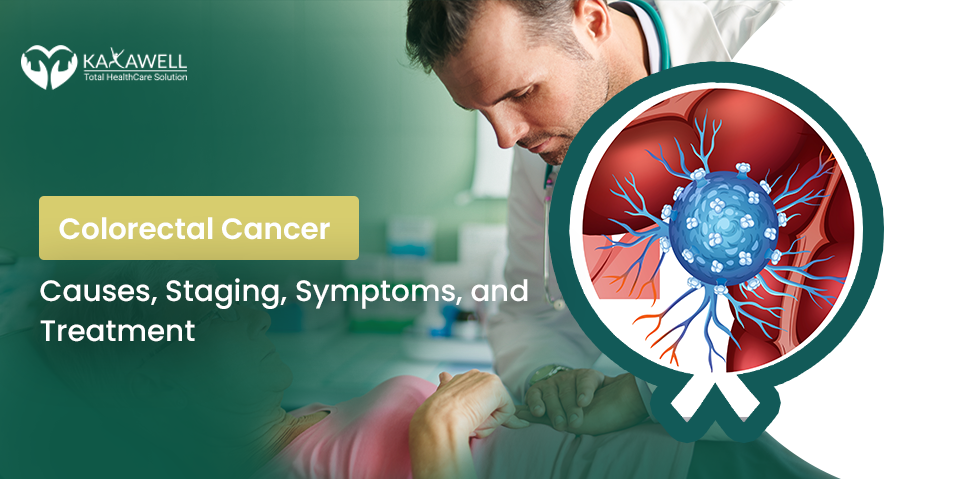Colorectal Cancer starts in the colon or the rectum. It is also called colon cancer or rectal cancer, depending on where they start. Generally, Colon cancer & rectal cancer are often grouped together as they have several standard features.
Colorectal cancer is the 2nd death cause in women and the 3rd in men. Now, due to new advances in screening techniques & improvements in treatments, the death ratio has gone down.
Colon cancer is cancer of the large intestine, the final part of the digestive tract. Most cases of colon cancer start as small, noncancerous (benign) clumps of cells called adenomatous polyps. Over time some of these polyps can become colon cancers.
Read Also: Everything About Cancer – Symptoms, Types, Causes, Treatment
Colorectal Cancer Symptoms Include:
- Change in your bowel habits, such as diarrhea, constipation
- Feeling like my bowel doesn’t empty completely at any time.
- Rectal bleeding
- Dark patches of blood in your stool
- Strong abdominal discomforts, like cramps, gas, and pain
- Fatigue or Weakness
- Continuously weight loss
Note: If you have symptoms like these, it doesn’t mean that you have some kind of cancer. You should make an appointment, or if a doctor tells you that you have anemia.
Also Read: Breast Cancer, Causes, Symptoms, Stages, Treatment
Your doctor will do a rectal exam. You may face colonoscopy exams that involve a long flexible tube put into your rectum to look for any cancers or leads to becoming cancer.
Colorectal Cancer Treatment
Colorectal Cancer Treatment depends on several factors, such as the location, size, stage, and the current overall state of health of the patient.

The Treatment may include surgery, chemotherapy, and radiotherapy.
Surgery for colorectal cancer:
The most common treatment is surgery for colorectal cancer in which the tumors and any nearby lymph nodes is removed to reduce the risk of cancer growth. Surgery may be successful for early-stage cancer.
The bowel is usually sewn back together. Sometimes the rectum is completely removed and a colostomy bag is attached for a drainage system that collects stools.
Also Read: Bladder Cancer-Stages | Symptoms | Diagnosis | Treatment
Chemotherapy:
In Chemotherapy, medicine or chemical is used to destroy the cancerous cells. It is commonly used for colon cancer treatment. It is used before surgery to shrink the tumor which is easily removed by surgery.
There are some side effects of chemotherapy such as extreme body pain, vomiting, diarrhea, hair loss, etc. Drugs that may be used for colorectal cancer include bevacizumab (Avastin) and ramucirumab (Cyramza).
Radiation therapy:
In Radiation therapy, high-energy radiation beams are used to destroy the cancer cells or to stop them from multiplying. This is more commonly used for rectal cancer treatment. It may be used before surgery in an attempt to shrink the tumor.
Ablation:
Ablation can destroy a tumor without removing it. It can be carried out using radio frequency, ethanol, or cryosurgery. These are delivered using a probe or needle that is guided by ultrasound or CT scanning technology.
Colorectal Cancer Prevention:
Your lifestyle measures may reduce the risk of developing colorectal cancer:

Regular Screenings: Regular screening is must be needed for those who have had colorectal cancer before, 50 years above aged people, who have a family history of cancer, or have Crohn’s.
Nutrition: Follow a diet with plenty of fiber, fruit, vegetables, good quality carbohydrates, and a minimum of red and processed meats. Switch from saturated fats to good quality fats, such as avocado, olive oil, fish oils, and nuts.
Exercise: Moderate, regular exercise has been shown to have a significant impact on lowering a person’s risk of developing colorectal cancer.
Body weight: Being overweight or obese raises the risk of many cancers, including colorectal cancer.

Leave a Reply
You must be logged in to post a comment.